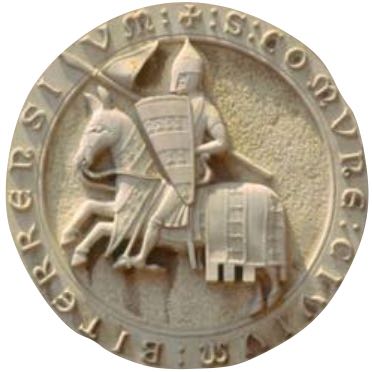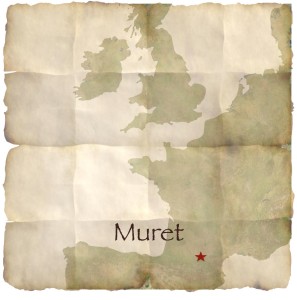‘The Prince pushed for Ximene to spend a few days in our camp. It will mean that they are more accessible to each other… herumph… for discussions.’
John Stanley-5th June 1355
The Earl talked through a survey of the weir with John and Piers. ‘The water is only three inches deep. Indeed, the water upstream does not look deep either. However, the surface of the weir seems very uneven and all that brushwood piled up at this end of the weir which must have been brought down when the river was high will make the passage difficult. We must get rid of the wood.’
Once again, Jesse Milton danced across the weir, paying out the string as he went. Soon a rope was stretched tight between two sturdy trees either side.
The Earl summoned John. ‘Right, commander. Today you are the axe man; get rid of the wood.’
Clinging to the rope, with one of his axes strapped over his shoulder, John clambered out to the pile of wood and carried out his own survey. He waited until he had a secure foothold clear of the water. He cautiously chopped through one branch at a time. The axes had been sharpened only that morning. The instinctive swinging motion he used sliced through the thicker branches and the axe’s weight enabled John to simply smash through the smaller branches. Suddenly half of the pile lifted, twisted and lunged over the weir, vanishing down the river. John danced around trying to keep his balance.
There was good-natured applause. John looked up and grinned before readjusting his footing. He continued until another large agglomeration of branches broke away. He then tried to adjust his footing once more. His intention was to cut through the middle of the remaining large branch which hung over the weir. Standing on the upstream end of the branch, he hoped to release the downstream end and the cluster of branches trapped by it.
John looked up and saw Piers pointing frantically at the end of the log behind him. He decided to make a few more cuts and then step sideways onto the weir. He didn’t want to fail in the task he had been allocated. He got it only slightly wrong, but it was enough. The log grated off the weir and for a brief moment, John was riding on it. John had time to realise that the river was flowing much faster than he had previously thought before the log, now floating free, turned beneath him. He fell backwards into the river, still clinging to his axe.
The icy water closed over his head. He made a stroke with his free hand and kicked with his legs and expected to rise to the surface, but the axe weighed him down. The axe was a family heirloom, he could not bring himself to release it. He was now on the bed of the river, crawling and scrambling. The force of the river seemed greater as he rolled over and over, still clinging on to his axe. His lungs were bursting. He opened his eyes to see a great pile of pebbles rushing towards him. Clouds of sand obscured his vision.
The strong current swept him sideways, but he just managed to hook his axe over a large stone. He pulled himself in, repeating the manoeuvre several times until he was pinned against the bank of pebbles. He then crawled painfully upwards, finally aided by the current. Suddenly his head broke water. He was on a sandbank in the river nearly two hundred feet from where he had fallen in. He gasped for air and was rewarded with a mouthful of sandy water. He pulled himself further out of the water and sat there heaving and coughing whilst he watched most of the expeditionary force running along the bank towards him.
‘John, John. Are you alright?’ The same call from twenty different voices.
Eventually, he found his voice. ‘No, I am not alright, but I am alive.’
It took over an hour to rescue John from his predicament and then to cross the river.
John was humiliated by his mistake, but many of the men made a point of praising his courage and skill.
Even the Earl seemed pleased but counselled John not to take the fulsome praise too seriously. ‘They are just glad that they did not have to do it.’
It crossed John’s mind as they left the weir, that it had nearly ended there and that if so he would have been unable to fulfil his duty to Ximene Trencavel. Duty? What fanciful nonsense!
They left the banks of the Ariège and, travelling south, reached the peak of a ridge running parallel to the Garonne. From there, just before midday on the sixth of June, they finally saw Muret and the bridge they would use to access the other bank of the river. As they moved towards the bridge, a campsite came into view. John counted five major tents, conical in shape, shining brilliant white, edged in red. Dozens of bivouac tents, of the type that ordinary soldiers and servants might use, surrounded the major tents. Because of its location on a bend of the river, the camp was bordered on two sides by the river.
On the third side, a barricade was marked along its whole length by pennants mounted on pikes. Every white pennant carried the unmistakeable lion rampant of Aquitaine. Just to make sure that no one could mistake the allegiance of the camp, in the very centre was an enormous flag on which the Lion of Aquitaine was at least nine feet tall as the flag rippled in the wind.
John noticed that neither the Prince nor the Earl was particularly surprised. In fact, as the Earl urged his horse to move on, John heard him say to the Prince that Pierre-Raimon de Comminges appeared to have done a good job.
The river was now much narrower than it had been at the start of their journey but ran with considerable force, the race between various small islands creating a sea of foaming undulating water. Though it was a pleasant day, the river had a greyish appearance. It was as if it was a symbolic warning of how even at the height of summer the river was icy cold. This was not a river to cross without assistance.
The bridge at Muret, although not far above the water level was solid and reliable. At the far end of the bridge were the town and the castle. The severity of the man-made structures was softened by an extensive meadow fringed by trees which reached out to higher ground both upstream and downstream of the town walls.
As they turned to make the descent to cross the bridge they saw, on the near side of the river on lower ground and upstream of Muret, a copy of their own camp. Similar conical tents dominated the layout though gold and red took the place of red and white.
‘At least two hundred strong,’ commented the Earl, narrowing an eye. ‘Is that a hunting party?’
Even as he spoke, a column of riders left the camp and wound their way up the hill towards them. The riders were in ceremonial dress, which repeated the colour scheme of the camp, whitest white with trimmings of red and gold. Every rider carried a lance with a red and gold pennant fluttering from its tip.
John saw the Prince glance around his own little troop. They were travel-worn and dirty and in any case had avoided finery to avoid attracting attention. Embarrassment showed clearly on the Prince’s face.
As the column drew nearer John heard the Prince swear under his breath. ‘The Comte de Foix himself coming to meet us, I did not want him to see us like this.’
He pulled himself upright in his saddle, forced a smile and urging his horse forwards, held out his hand ‘Gaston, good to see you again.’ The two men manoeuvred their horses alongside each other and shook hands.’ John was amazed to see that Gaston, Comte de Foix was a very young man.
Gaston and the Prince rode about fifty feet away for a private discussion. The Prince returned, looking a little easier. After a hurried conversation with the Earl, the Prince led the whole force as it wound its way down to the bridge, across the river and ascended the other side. Instead of entering the town they turned to the right, downstream, to their own camp.
Once they were within the bounds of the camp the Earl called John and Piers over. ‘Well, that did not go too well. The Prince was absolutely furious at the way the Gaston Phoebus stole the ascendancy at the first meeting. Incidentally, he was also furious that Gaston, who owes allegiance to him for his lands in Bearn, routinely treats him as an equal.
The Earl’s voice was suddenly crisp. ‘But that is not really what I want to address. The Prince pushed for Ximene to spend a few days in our camp. It will mean that they are more accessible to each other… herumph… for discussions.’
‘The Prince is determined that she should be entertained royally. He has agreed however that for propriety it is essential she has a chaperone. The obvious choice is her grandmother, Lady Eleanor, who is already the Prince’s guest at his castle at Beaufort, only three leagues from here.’ He stopped and looked them up and down. They were as dishevelled as anyone else in their little troop. ‘By all means, refresh yourselves by bathing in the river but within the hour I want you in your uniform, ready to accompany me to Beaufort to escort Lady Eleanor back to our camp.’
As they rode towards Beaufort John looked with satisfaction at the pennant fluttering from his lance. He rose in the saddle and turned to look at the riders behind them. He turned and smiled at Piers who was riding beside him. ‘This is more like it,’ he said. ‘For the first time I feel like a royal guard.’
Piers raised one eyebrow. ‘And who knows where that will take us. Responsibility is always accompanied by challenges ‘

